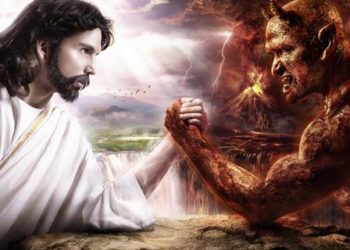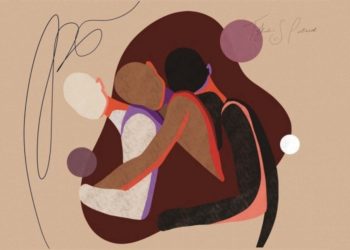In different countries, the weather is an effective conversation starter. In Nigeria, however, nothing opens and sustains a conversation better than the term “Buhari.” Once tossed into the air, it blooms, swells with new life, and bursts into a heated debate. On this sweltering February afternoon, Buhari was again the center of discussion on our rickety bus.
The consensus?
Everyone was tired. February 25th, 2023 couldn’t come any faster. A new president was needed. Then, the pregnant coconut was broken: Are you going to vote?
“Vote, ke?” one man asked, “So they’ll shoot me dead on that day? My firstborn still dey SS1 biko.”
“Nna, thank you! I don collect voter’s card. I dey use am as ID. Person no dey comot my house that election day. Make them no use us as sacrifice for this nonsense country.”
“This election will be hot. But God pass them. PO go win. God go hear our cry.”
Everyone agreed. They would not vote, but PO will win. This interaction reminded me of a story whispered on my primary school playground. A childhood fable of sorts. The story of a boy who did not study but still ended up getting an A in his exams.
Let’s call this boy Clifford.
On receiving his question paper that chilly examination morning, Clifford realizes he doesn’t know the answers to any of the questions. Something—affectionately called ata in Igbo-speaking Nigeria—snaps on the crown of his head. Sweat percolates on his forehead and upper lips. Suddenly, his body was beset with itches. As Clifford was a strong Christian, cheating, or anything of the sort, was not an option. After ninety minutes spent in pen-chewing anxiety, Clifford says a prayer and turns in his paper. Heart swollen with hope, he leaves the hall, confident that God will come through for him.
That night on the other side of town, a grizzly teacher marks the scripts. The orange glow of a single kerosene lamp illuminates the white answer sheets. The wispy penmanship of the students stands before him, mortals to be judged by a pen-wielding deity. It is nearly midnight. Safe from the scratch of the judgemental red pen on paper, the house is quiet. Eager to be done with the last batch and join his wife in bed, the teacher’s red pen flies quickly over the students’ answers. The last one on the pile is Clifford’s. He opens it. The words “Clifford Ogwumagala Orji” are written in exquisite penmanship. But that’s all.
No answers.
No attempts at answering.
Nothing.
Tut-tutting his disapproval, the teacher rules over the empty pages, strokes of damnation. Clifford was definitely coming back next year. He draws two question marks on the booklets’ cover. Unfortunately, he doesn’t dot the bottom of the question mark hooks. He blows out the lantern and rushes off into the welcoming darkness of his matrimonial room.
That morning, the booklets are shipped off for recording. The teacher in charge of recording is meticulous and focused, careful to put the correct scores into the little grade boxes. Another staff member pokes his head into the room as she picks up Clifford’s booklet.
“Hurry up! Staff meeting has started.”
She jerks her head in understanding like a marionette jerked by a puppeteer. She sees the question mark hooks and records:
77…A.
And just like that, our dear Clifford got an A.

Clifford’s story was an urban myth in my primary school. Everyone prayed for such grace—especially those who didn’t study. This is a textbook case of spiritual bypassing.
The concept of Spiritual Bypassing was put forward by clinical psychologist and psychotherapist John Welwood. Welwood defines spiritual bypassing as the tendency to use spiritual ideas and practices to sidestep or avoid facing unresolved emotional issues, psychological wounds, systemic issues, and unfinished developmental tasks. Spiritual bypassing can look like:
- Trying to pray away weight gain, infidelity, abuse, or penury instead of taking action
- Not studying and praying for Clifford’s “protocol-breaking” grace
- Not voting but hoping the best man wins

And I get it. I get why we do this. It is essentially what the ostrich does when it buries its head in the sand. It’s the same reason kids close their eyes with their palms when confronted by something scary. What I cannot see—or, in this case, can’t admit—does not exist. I get it, man; I do. Most of these truths can be hard to confront.
Realizing your partner is cheating because they don’t respect you is hard.
Admitting your bad financial hygiene is keeping you broke is as painful as wearing thongs that are two sizes too small.
Coming to terms with the fact that you failed because you didn’t study (enough) is hard.
Accepting that the country is the way it is because you did not vote during the last two elections can be as difficult as swallowing roasted yam without water. It is human and normal to avoid emotional and psychological pain. This is why we experience things like the sunk cost fallacy. This attempt to stay stable and not be overwhelmed is a trait we all have. However, just because something is natural doesn’t mean it’s healthy.

A scatter diagram of the denizens of the political entity called “Nigeria” would see a significant number of the populace falling into two groups:
- Parochial Political Culture: They don’t know what an election is nor who the different candidates are, and they don’t care. Una election no epp anyone. (Think of the old papas and mamas in the village)
- Subject Political Culture: They know what elections are, the different candidates and their parties (and their political jingles), and may even debate on which candidate has the better manifesto. However, they don’t vote—and generally just go with whoever the (s)election flow brings. Chill, guys, these lot. (e.g., the people on my bus)
There is, however, a third group. Participatory political culture.
These guys know about politics and electoral processes and actively participate in them. Unlike the other two groups who are disenfranchised because of ignorance and lackadaisicality, respectively, this last group knows their votes count and endeavor to put their thumb to paper on the day of reckoning
So how do we prevent spiritual bypassing from impeding POssibility this election period?
By marrying prayers and action.
Prayers, like food, should be a form of nourishment, not escapism. They should nourish actions that have already been put in place. Not used as a bandaid over the sore of inaction. When you complete a pattern, you don’t have to deal with it anymore. When you vote out lousy leadership, you start to reap the fruits of good governance. You experience how good it is to be ruled by a president, not a presidency; how good it is to have a present president, not one that’s touring the globe.
What God cannot do, does not exist. However, the bible unequivocally states that faith without works is dead. Different religions emphasize the primacy of action. Why? Because God works through human instruments. He will not come down and thumbprint on that day, nor will he magically make the numbers favor the best POssible candidate if you don’t come out to vote.
So, my people, allow God to use you.
Vote during the election.
Vote wisely.
Vote for POssibility.
Want to read more of my thoughts on the intersections of religion and the Nigerian psychology? Check out The Business of Hope and the Economics of Religion in Nigeria.








This is a brilliant piece. One every Nigerian should read if possible as it would enlighten and bring a more compound orientation into the electoral system of Nigeria.